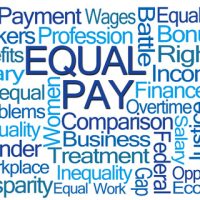Understanding California’s Equal Pay Act

You probably already know that we thankfully live in a day and age when women must get paid the same as their male counterparts in the workplace. What you may not know is that there are not only federal, but also California state laws that protect this right—and give you the right to bring a lawsuit against your employer, should you not be paid fairly at work.
Equal Work, Equal Pay
California’s equal pay act says that so long as women and men are performing what is known as “substantially similar” work, they must be paid equally at work. For the work to be substantially similar, it must involve the same degree of skill, experience, ability, effort, or responsibility. The work must be performed under similar working conditions.
The equal pay requirement applies to employees in the same company, regardless of location. So, if a man worked in a corporate office in San Francisco and a woman worked for the same company for their San Diego office, and the woman was paid less, it would still be a violation, despite being in different locations.
The work doesn’t have to be exactly similar, it can be substantially similar, making it harder for employers to claim that the work was truly different. So, for example, a cleaning person and a janitor may be similar, the same as a retail cashier and a retail stock person may be similar, even though their jobs aren’t exactly identical.
Defenses and Exceptions
There are some defenses and exceptions to equal pay.
Any employer who pays men and women differently or which evaluates employees based on a bona fide and established system of authority, merit, or the quality of work, can pay women and men differently. Additionally, the employer can put forth any other rational explanation for the difference in pay, if one exists (for example, educational background). However, this is difficult for employers to prove.
Damages for Violations
Violations of the act by employers can lead to serious damages. Female employees who aren’t paid the same as their male counterparts can receive two times the amount of the pay discrepancy. So, for example, if you are paid $20,000 less than a male in your workplace for the same work, you could recover $40,000 in damages. Additionally, your employer would also have to pay your attorney’s fees and costs.
Freedom of Information
How do you know if a male employee is making more than you are? One easy way is to ask; California employers cannot prohibit you from discussing salary and payment with your coworkers, nor can your employer punish you in any way for doing so.
Nationality is Protected
And although we have been using the terms “male” and “female,” it isn’t just gender that’s protected and which must be equal. Equal pay doesn’t just extend to gender. It is also a violation to pay someone of different races or national origins differently, for performing similar kinds of work.
Contact the San Jose employment lawyers at the Costanzo Law Firm today if you feel you are the victim of discrimination in the workplace.
Source:
dir.ca.gov/dlse/california_equal_pay_act.htm
